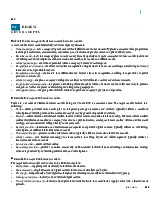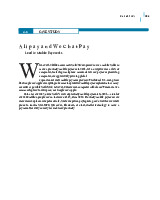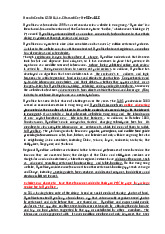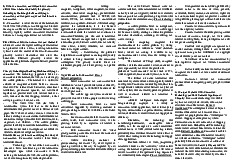









Preview text:
lOMoAR cPSD| 58583460 1. Introduction
My name is Chau My Tam, and I'm a second-year business administration student at
International University. This essay explores my personal and professional development journey
through the lens of soft skills, with insights provided by guest speakers during this semester's
Workshop1 course. Soft skills like communication, teamwork, and adaptability are essential for
both personal growth and occupational success. These skills help us develop good relationships,
foster effective collaboration, and negotiate the complexity of the professional environment.
Effective communication, for example, allows us to transmit ideas clearly and establish
connections with others, whereas collaboration and adaptability allow us to thrive in dynamic
situations and overcome challenges. In this reflection essay, I'll give a summary of my personality
traits and their effects on my interactions, reflect on the key lessons learned from the guest
speakers, analyze the application of these skills in real-life scenarios, and outline a development
plan for further enhancing my soft skills in the future.
2. Personality (Know Yourself)
Personality Traits: Describe your key personality traits, highlighting those that significantly impact your interpersonal interactions.
Insights from Assessments: Reflect on any formal or informal personality assessments you have taken and how their
results align with your self-perception and behavior.
3. Insights on Soft Skills from Workshop 1
Key Learnings from Speakers: Summarize the critical insights provided by the guest speakers regarding soft skills.
Impact on Personal Views: Analyze how these insights have modified or reinforced your views on the importance and application of soft skills.
Integration with Personal Experiences: Connect the speakers' advice to your personal experiences where you have
noticed the use or need for enhanced soft skills.
4. Application of Soft Skills in Real Situations
Personal Application: Provide examples from your life where you successfully applied soft skills.
Challenges and Improvements: Discuss situations where you struggled with using soft skills and explore what you could have done differently.
Feedback Received: Include any feedback you've received from peers, mentors, or educators regarding your soft skills
and how you've responded to this feedback.
5. Development Plans for Soft Skills
Areas for Growth: Identify specific soft skills you need to develop or strengthen.
Action Plan: Detail actionable steps you plan to take to improve these skills, such as training, reading, or more practical
engagement in team activities.
Goals and Objectives: Set clear goals for your soft skills development, including timelines and metrics for measuring improvement. lOMoAR cPSD| 58583460 6. Conclusion
Summary of Reflections: Recap the main points of your reflection, emphasizing the transformative insights and personal growth experienced.
Future Implications: Discuss how continuing to develop soft skills will impact your future academic and career goals.
Closing Thoughts: Offer a final reflection on the importance of self-awareness and continual learning in personal and professional development.
Reflective Essay on the Development of Soft Skills
Throughout my academic journey, I have recognized the importance of not only acquiring
technical knowledge but also honing essential soft skills that significantly contribute to
personal and professional success. Soft skills such as communication, teamwork,
emotional intelligence, and stress management facilitate better relationships, enhance
productivity, and often serve as differentiators in achieving career success and personal fulfillment.
My name is Chau My Tam, and I am currently pursuing Business Administration majoring
in International Business. This essay delves into my experiences and growth in soft skills,
particularly focusing on insights gained from guest speakers during Workshop
1. It will provide an overview of my personality traits and their impact on my
interactions, reflect on key lessons learned from the guest speakers, analyze the
application of these skills in real-life situations, and outline a development plan for
further enhancement. Personality (Know Yourself)
My key personality traits include empathy, resilience, and a tendency towards introversion.
Empathy allows me to connect deeply with others, understanding their emotions and
perspectives, while resilience helps me bounce back from setbacks. However, my
introverted nature often makes me reflective and introspective.
Various personality assessments, such as the Myers-Briggs Type Indicator (MBTI) and the
StrengthsFinder, have provided valuable insights into my behavioral tendencies. The MBTI
identified me as an INFJ (Introverted, Intuitive, Feeling, Judging), which aligns well with
my self-perception as a reflective and empathetic individual. These assessments have
validated my self-awareness and highlighted areas for growth, particularly in enhancing
my assertiveness and social engagement.
Understanding my personality type has been crucial in identifying my strengths and
weaknesses. For instance, as an INFJ, I thrive in situations that require deep thinking and
empathy, but I can struggle in highly extroverted settings where quick decision-making is
necessary. Recognizing this has allowed me to focus on developing my social skills and
becoming more comfortable in group settings. lOMoAR cPSD| 58583460
Insights on Soft Skills from Workshop 1
Workshop 1 was an eye-opener in many ways, emphasizing the importance of soft skills.
Sessions on communication and teamwork skills, the art of questioning, and giving
opinions were particularly enlightening. However, the session that stood out the most for
me was led by Ms. Mai Dao on "Emotion and Stress Management."
At the time, I was struggling with a series of negative events in my personal life, which
had put me in a bad mood and affected my academic performance. Ms. Mai Dao’s session
was transformative. It was more like a psychological counseling day, helping me
understand my emotions better and providing practical strategies to manage stress. Her
empathetic approach and practical advice made a lasting impression on me, helping me
shift my perspective and develop a more positive approach to managing emotions.
Her insights resonated deeply with me. She introduced us to various stress management
techniques, including mindfulness, deep breathing exercises, and the importance of
maintaining a balanced lifestyle. One technique that particularly resonated with me was the
practice of mindfulness meditation. This involves focusing on the present moment and
acknowledging one’s thoughts and feelings without judgment. By incorporating
mindfulness into my daily routine, I found myself becoming more aware of my emotional
triggers and better equipped to handle stress.
I recall a specific instance when I was overwhelmed with academic deadlines and personal
issues. By applying her techniques of mindfulness and stress management, I was able to
regain control of my emotions and approach my tasks with a clearer, more focused mind.
This not only improved my academic performance but also my overall well-being.
Furthermore, Ms. Mai Dao emphasized the importance of maintaining a healthy work-life
balance. She encouraged us to engage in activities that bring joy and relaxation, such as
hobbies or spending time with loved ones. Following her advice, I made a conscious effort
to balance my academic responsibilities with leisure activities. I started painting again, a
hobby I had neglected due to my busy schedule. This not only helped me relax but also
sparked my creativity, which positively impacted my academic projects.
Application of Soft Skills in Real Situations
In my role as a team leader for a project on analyzing the Vietnamese market for Apple, I
effectively utilized communication and teamwork skills. By fostering an inclusive
environment where team members felt valued and heard, we were able to collaborate
efficiently and produce a comprehensive report.
During this project, I faced several challenges that tested my leadership and teamwork
abilities. One particular challenge was managing conflicts within the team. Differences in
opinions and working styles led to misunderstandings and disagreements. Drawing on the
communication skills I learned from the workshop, I facilitated open and respectful lOMoAR cPSD| 58583460
discussions where team members could express their concerns and ideas. By actively
listening and mediating conflicts, we were able to reach a consensus and move forward with a unified approach.
There were instances where I struggled with assertiveness, particularly when making tough
decisions. For example, during a critical phase of our project, a team member presented
falsified data. Although I addressed the issue by reallocating tasks and ensuring data
integrity, the situation highlighted my need to improve assertiveness in enforcing ethical
standards. This experience taught me the importance of setting clear expectations and
holding team members accountable for their actions.
Additionally, I applied emotional intelligence to build stronger relationships within the
team. By being aware of my emotions and understanding the emotions of others, I was able
to create a supportive and collaborative atmosphere. This not only enhanced our
productivity but also fostered a sense of camaraderie and mutual respect among team members.
Feedback from peers and mentors has been instrumental in my development. My peers
appreciated my empathetic leadership style but also pointed out the need for more decisive
actions in critical situations. I have taken this feedback to heart and am actively working
on balancing empathy with assertiveness.
One of the most significant pieces of feedback I received was from my mentor, who
emphasized the importance of being proactive rather than reactive. He advised me to
anticipate potential issues and address them proactively rather than waiting for problems
to arise. Implementing this advice has helped me become a more effective leader, as I am
now better prepared to handle challenges and ensure smooth project execution.
Development Plans for Soft Skills
Based on my reflections and feedback, I have identified several areas for growth:
assertiveness, public speaking, and advanced stress management techniques.
To improve these skills, I plan to engage in the following activities:
1. Training: Enroll in workshops focused on assertiveness and public speaking.
2. Reading: Read books and articles on effective leadership and emotional intelligence.
3. Practical Engagement: Participate more actively in group discussions and take on
leadership roles in extracurricular activities.
My goals include becoming more confident in public speaking within six months and
developing a more assertive communication style within a year. I will measure my progress
through peer feedback and self-assessment after each significant engagement. lOMoAR cPSD| 58583460
Moreover, I plan to continue practicing mindfulness and stress management techniques. I
will dedicate time each day to mindfulness meditation and incorporate stress-relief
activities into my routine. Additionally, I will seek out opportunities to practice public
speaking, such as presenting at seminars or joining a public speaking club. These
experiences will help me build confidence and improve my ability to communicate
effectively in front of an audience.
To track my progress, I will maintain a journal where I document my experiences,
challenges, and achievements related to soft skills development. This will provide a
valuable record of my growth and help me identify areas that require further improvement. Conclusion
Reflecting on my journey, the insights gained from Workshop 1, particularly from Ms. Mai
Dao’s session, have been pivotal. Understanding and managing emotions, coupled with
effective communication and teamwork, have significantly enhanced my personal and professional interactions.
Continuing to develop these soft skills will be crucial in achieving my future academic and
career goals. As I strive to become a well-rounded professional, the lessons learned from
these experiences will guide me in creating positive and productive environments.
In conclusion, the journey of self-awareness and continual learning is invaluable.
Embracing this journey, with a focus on enhancing soft skills, will not only lead to personal
growth but also pave the way for professional success. I am grateful for the transformative
insights provided by the guest speakers and look forward to applying these lessons in my future endeavors.
By acknowledging my strengths and weaknesses, seeking out opportunities for growth, and
actively applying the lessons learned, I am confident in my ability to develop the soft skills
necessary for success. This reflective essay has provided a valuable opportunity to assess
my progress and set clear goals for the future, ensuring that I continue to grow both
personally and professionally.
Reflective Essay: Nurturing Soft Skills for Personal and Professional Growth Introduction:
My name is Chau, and I am currently pursuing a degree in Business Administration with a
focus on International Business. Reflecting on my experiences in Workshop 1, a subject I
enrolled in with my friends this semester, I am compelled to explore the transformative
journey I've embarked on in understanding and honing soft skills. This reflective essay lOMoAR cPSD| 58583460
aims to delve into the significance of soft skills, draw insights from guest speakers like Ms.
Mai Dao, and outline my personal growth and development in this domain. Personality (Know Yourself):
As an INTJ personality type, I've always approached challenges with a strategic mindset
and a penchant for logical reasoning. However, my interactions with others often
highlighted the importance of softer qualities such as empathy and communication.
Discovering my MBTI type, facilitated by Ms. Cam Linh, added depth to my
selfawareness, reaffirming my strengths while illuminating areas for improvement.
Insights on Soft Skills from Workshop 1:
Workshop 1 was a revelation in understanding the nuances of soft skills and their impact
on personal and professional spheres. Guest speakers like Ms. Mai Dao, with her session
on "Emotion and Stress Management," provided invaluable tools for navigating life's
challenges with resilience and composure. Her guidance on self-awareness and
mindfulness profoundly influenced my approach to managing stress and fostering emotional well-being.
Application of Soft Skills in Real Situations:
Throughout Workshop 1, I found ample opportunities to apply soft skills in real-life
scenarios. From group activities to role-plays, I honed my communication, teamwork, and
emotional intelligence. One notable instance was during a team project where effective
communication and collaboration were crucial for success. By leveraging my strengths and
learning from challenges, I navigated interpersonal dynamics with greater finesse and achieved favorable outcomes.
Development Plans for Soft Skills:
Reflecting on my experiences, I've identified areas for growth in my soft skills repertoire.
As an INTJ, I recognize the importance of enhancing my emotional intelligence and
interpersonal communication. To achieve this, I plan to engage in targeted training lOMoAR cPSD| 58583460
programs, participate in networking events, and seek mentorship opportunities. Setting
clear goals and timelines will guide my journey towards continuous improvement in these areas. Conclusion:
In conclusion, Workshop 1 has been a transformative experience, illuminating the
importance of soft skills in personal and professional success. Through insightful sessions
and practical applications, I've gained valuable insights into communication, teamwork,
and emotional intelligence. The guidance of guest speakers like Ms. Mai Dao has been
instrumental in shaping my understanding and practice of soft skills, empowering me to
navigate life's challenges with confidence and resilience. As I continue on this journey of
self-discovery and growth, I am committed to cultivating these essential qualities and
leveraging them to achieve my academic and career goals. Soft skills are indeed the
cornerstone of personal and professional excellence, and I am eager to continue honing them for lifelong success.
__________________________________________________________________-
Throughout my academic journey, I have recognized the importance of not only acquiring
technical knowledge but also honing essential soft skills that significantly contribute to
personal and professional success.
Soft skills such as communication, teamwork, and adaptability facilitate better relationships,
enhance productivity, and often serve as differentiators in achieving career success and
personal fulfillment. These skills help us develop good relationships, foster effective
collaboration, and negotiate the complexity of the professional environment. Effective
communication, for example, allows us to transmit ideas clearly and establish connections with
others, whereas collaboration and adaptability allow us to thrive in dynamic situations and overcome challenges.
My name is Chau My Tam, and I'm a second-year business administration student at
International University. This essay explores my personal and professional development journey
through the lens of soft skills, with insights provided by guest speakers during this semester's
Workshop1 course. In this reflection essay, I'll give a summary of my personality traits and their
effects on my interactions, reflect on the key lessons learned from the guest speakers, analyze the
application of these skills in real-life scenarios, and outline a development plan for further
enhancing my soft skills in the future.
My key personality traits include strategic thinking, independence, and a preference for
planning, as identified in the class of Ms. Cam Linh – one of my favorite guest speakers
by the Myers-Briggs Type Indicator (MBTI), which classifies me as an INTJ (Introverted,
Intuitive, Thinking, Judging). These traits have shaped my approach to learning and lOMoAR cPSD| 58583460
interacting with others. The INTJ personality is often characterized by a drive for efficiency
and a desire for understanding complex systems, which aligns with my self-perception as
a logical and strategic thinker.
Various personality assessments, such as the MBTI and the StrengthsFinder, have provided
valuable insights into my behavioral tendencies. These assessments have validated my self-
awareness and highlighted areas for growth, particularly in enhancing my emotional
intelligence and social engagement. Understanding my personality type has been crucial in
identifying my strengths and weaknesses. For instance, as an INTJ, I excel in strategic
planning and problem-solving but can struggle in highly social settings that require
spontaneous interaction. Recognizing this has allowed me to focus on developing my social
skills and becoming more comfortable in group settings.
Workshop1 opened my eyes in a variety of ways. It is unlike any other subject, emphasizing the
significance of soft skills through engaging lectures by renowned guest speakers. The sessions on
communication and cooperation skills, as well as the art of questioning and expressing viewpoints,
were very informative. However, Ms. Mai Dao's class on "Emotion and Stress Management" stuck out the most to me.
At the time of the Midterm exams, I was dealing with a series of terrible occurrences in my personal
life, which had placed me in a bad mood and caused stress, affecting my academic performance.
Ms. Mai Dao's session occurred coincidentally, curing my mental wellness. It's not like any other
class I've taken. It felt more like a psychological counseling session, with me learning more about
my emotions and receiving practical tools for managing emotions, mood, and sadness. Her
empathic attitude and practical suggestions left a lasting impression on me, assisting me in shifting
my perspective and developing a more positive approach to controlling emotions, regulating my
psychology, and avoiding affecting the next exam.
Her observations struck a deep chord with me. She initially introduced us to various stress
management approaches, such as mindfulness, deep breathing exercises, and the value of living a
balanced lifestyle. One approach that stood out to me was mindfulness meditation. This entails
focusing on the present moment and accepting one's thoughts and feelings without judgment. By
adopting mindfulness into my daily practice, I became more aware of my emotional triggers and
more prepared to deal with stress. I recall one time when I felt overwhelmed by academic deadlines
and personal difficulties. Using her mindfulness and stress management skills, I was able to regain
control of my emotions and approach my tasks with a clearer, more focused mind.
This enhanced both my academic achievement and my entire well-being.
Ms. Mai Dao also underlined the need of keeping a healthy work-life balance. She urged us to
engage in enjoyable and relaxing activities, such as hobbies or spending time with loved ones.
During that session, she also prepared several activities to help our class become more connected.
Following her counsel, I made a concerted effort to reconcile my academic obligations with
recreational hobbies. I began painting again, a hobby I had abandoned due to my hectic schedule.
This not only helped me relax, but it also boosted my imagination, which benefited my academic assignments. lOMoAR cPSD| 58583460
Alternatively, in my capacity as team leader for another course's project, I effectively used
communication and teamwork abilities. We were able to compile a complete report by creating an
inclusive workplace in which team members felt appreciated and heard. Several problems arose
during the course of this project, putting my leadership and collaborative skills to the test. One
significant problem was dealing with internal team disagreements. Differences in beliefs and
working methods resulted in misunderstandings and disputes. Using the communication skills I
gained at the program, I encouraged open and polite discussions in which team members could
voice their concerns and suggestions. By actively listening and mediating issues, we were able to
reach an agreement and go forward with a cohesive strategy. There were times when I battled with
assertiveness, especially when making difficult judgments. For example, during a key point of our
project, one of the team members refused to cooperate. She was always late submitting tasks,
which had an impact on the productivity and performance of the entire team. The solution here is
that I had to define the regulation and apply the assessment board to each member, which has a
direct impact on individual grades. This event taught me the value of leadership and teamwork.
In addition, I used emotional intelligence to strengthen team relationships. By being conscious of
my own emotions and understanding the feelings of others, I was able to foster a supportive and
collaborative environment. This not only increased our production, but also generated a spirit of
teamwork and mutual respect among members.
Feedback from my team and lecturer has been really beneficial to my development. My colleagues
praised my strategic leadership approach, but they also emphasized the necessity for more decisive
responses in critical situations. I took your feedback to heart and am actively working on
combining empathy with assertiveness. One of the most critical pieces of criticism I received was
from my lecturer, who emphasized the need of being proactive rather than reactive. He urged me
to anticipate possible difficulties and address them proactively rather than waiting for them to
occur. Implementing this advise has helped me become a more effective leader, as I am now more
prepared to face problems and assure project success. Based on my reflections and suggestions,
I've identified several areas for improvement, including assertiveness, public speaking, and
advanced stress management skills. To improve these skills, I intend to attend workshops on
assertiveness and public speaking, read books and articles on effective leadership and emotional
intelligence, participate more actively in group discussions, and take on leadership roles in
extracurricular activities. My goals include increasing my confidence in public speaking within
six months and creating a more forceful communication style by a year. I will track my success by
providing feedback to those who work with me and conducting self-assessments after each key encounter.
Furthermore, I intend to continue practicing mindfulness and stress-management strategies.
I'll set aside time each day for mindfulness meditation and add stress-relieving activities
into my routine. In addition, I want to seek out opportunities to practice public speaking,
such as presenting at seminars or joining a public speaking group. These experiences will
help me gain confidence and increase my ability to successfully communicate in front of lOMoAR cPSD| 58583460
an audience, which is currently my problem. To track my progress, I plan to keep a
notebook in which I will record my soft skill development experiences, problems, and
accomplishments. This will serve as a helpful record of my progress and help me find areas for improvement.
Reflecting on my journey, the ideas received from Workshop 1, particularly Ms. Mai Dao's
session, have piqued my interest. Understanding and controlling emotions, combined with
excellent communication and teamwork, has greatly improved my personal and
professional interactions. Continuing to develop these soft skills will be critical to reaching
my future academic and professional goals. As I work to become a well-rounded
professional, the insights learnt from these events will help me create good and productive settings.
In conclusion, the journey of self-awareness and continuous growth is invaluable.
Embracing this journey, with an emphasis on improving soft skills, can not only result in
personal progress but also in professional success. I appreciate the transforming insights
presented by the guest speakers, particularly Ms. Mai Dao, and look forward to utilizing
these teachings in my future activities. I am confident in my capacity to build the soft skills
required for success because I recognize my strengths and shortcomings, seek out
opportunities for progress, and actively implement what I've learned. This reflective essay
has given me an excellent opportunity to evaluate my accomplishments and establish
specific goals for the future, ensuring that I continue to grow both personally and professionally.



